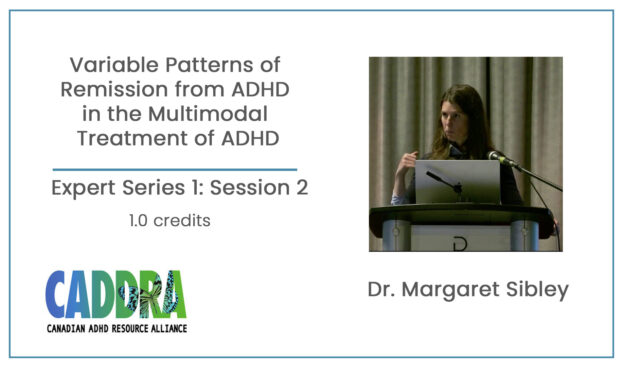Variable Patterns of Remission from ADHD in the Multimodal Treatment of ADHD
1. Recognize best practices in the identification of fully and partially remitted ADHD case.
2. Identify longitudinal trajectories of ADHD remission from childhood to young adulthood.
3. Apply steps to clinical practice that promote effective monitoring of ADHD over time and remission
of symptoms in patients
Objective: The Multimodal Treatment Study of ADHD (MTA) investigated the extent to which children with ADHD experience recovery by adulthood.
Methods: Children with ADHD (N=558) in the MTA were administered eight assessments from 2-year (M age=10.44) to 16-year follow-up (M age=25.12). We identified participants with fully remitted, partially remitted, and persistent ADHD at each timepoint based on parent, teacher, and self-reports of ADHD symptoms and impairment, treatment utilization, and substance use and mental disorders. Longitudinal patterns of remission and persistence were identified that considered context and timing.
Results: Approximately 30% of children with ADHD experienced full remission at some point during the 14-year follow-up period; however, a majority (60% of these) experienced recurrence of ADHD after the initial period of remission. Only 9.0% of the sample demonstrated recovery from ADHD by study endpoint and only 10.8% demonstrated stable ADHD persistence across study timepoints. Most participants with ADHD (64.0%) demonstrated fluctuating periods of persistence and remission over time.
Conclusions: The MTA findings challenge the notion that approximately 50% of children with ADHD outgrow the disorder by adulthood. Most cases demonstrated fluctuating symptoms. Although 90% of children with ADHD continued to struggle with residual ADHD through young adulthood, intermittent periods of remission can be expected in most cases. A visual depiction of longitudinal and cross-sectional patterns of symptom remission, recovery, and persistence, as well as case examples will be shared. Findings emphasize that childhood-onset ADHD is a chronic but waxing/waning with periods of full remission that are more often temporary than sustained.
 Margaret (Maggie) Sibley, Ph.D. is an Associate Professor of Psychiatry & Behavioral Sciences at the University of Washington School of Medicine and a researcher and practicing psychologist Seattle Children’s Hospital.
Margaret (Maggie) Sibley, Ph.D. is an Associate Professor of Psychiatry & Behavioral Sciences at the University of Washington School of Medicine and a researcher and practicing psychologist Seattle Children’s Hospital.
Her research focuses on the diagnosis and treatment of ADHD in adolescents and young adults. Her research is funded by the National Institute of Mental Health and Institute of Education Sciences-funded work and focuses on adapting non-pharmacological interventions for ADHD to under-resourced school and community contexts, with a focus on patient engagement. She serves on the professional advisory board of CHADD, the editorial advisory board of Attention magazine, and is currently an Associate Editor of the Journal of Attention Disorders as well as the secretary of the American Professional Society of ADHD and Related Disorders. She is a member of the Multimodal Treatment of ADHD (MTA) Cooperative Group and the author of a book on treating ADHD in adolescents (2016, Guilford Press). She has authored or co-authored over 100 scholarly publications on ADHD in adolescence and young adulthood.
CADDRA – Canadian ADHD Resource Alliance has been approved by the College of Family Physicians, the Royal College of Physicians and Surgeons of Canada and the Canadian Psychological Association to offer 1 Mainpro credit / 1.25 MOC credits for this session. CADDRA maintains responsibility for the program. Participation in a discussion forum and completion of a reflective exercise are required for certification.
Course Content

